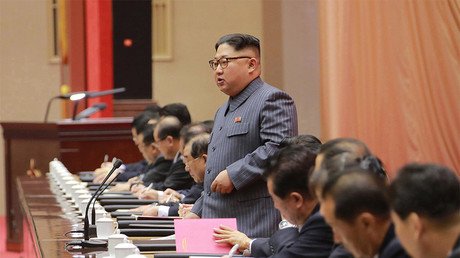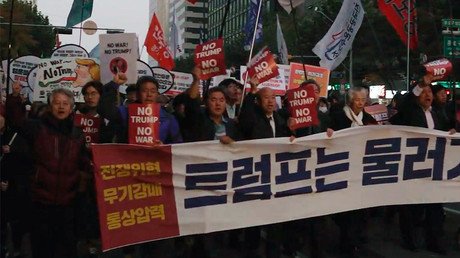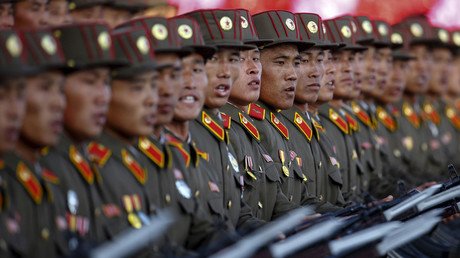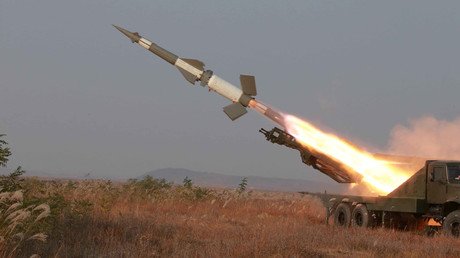Kim warns Washington of ‘nuclear button on desk’ but vows ‘Olympic truce’ with South Korea
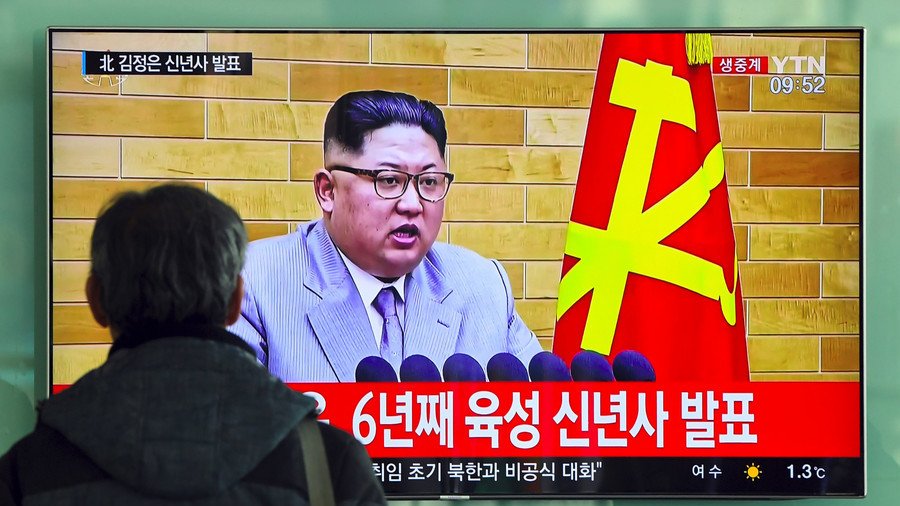
After issuing threats to the US in his New Year’s message, Kim Jong-un offered some hope of a thaw in relations with South Korea, saying Pyongyang is open to talks, while wishing success for the 2018 Pyeongchang Winter Olympics.
“The entire United States is within range of our nuclear weapons, and a nuclear button is always on my desk. This is reality, not a threat,” he said in a televised speech, adding that “these weapons will be used only if our security is threatened.”
“We achieved the goal of completing our state nuclear force in 2017,” Kim said. “We need to mass-produce nuclear warheads and ballistic missiles and accelerate their deployment.”
However, the North Korean leader softened his tone regarding South Korea in the same speech.
“When it comes to North-South relations, we should lower the military tensions on the Korean Peninsula to create a peaceful environment,” Kim said. He added that “both the North and the South should make efforts [for peace].”
Reaching out to South Korea, which is preparing to host the Olympics for the second time in its history, Kim said Pyongyang would utilize the 2018 Pyeongchang Winter Games to start reconciliation with Seoul, and even consider sending a national sports team.
“North Korea’s participation in the Winter Games will be a good opportunity to showcase the national pride and we wish the Games will be a success. Officials from the two Koreas may urgently meet to discuss the possibility,” said Kim, dressed in a western-style suit and tie instead of his ordinary semi-military fatigues.
Meanwhile, Lee Hee-beom, president of the Pyeongchang Organizing Committee, told Reuters the hosts welcome North Korea’s participation: “The [organizing committee] will discuss relevant matters with the South Korean government as well as the International Olympic Committee.”
Pyongyang’s peace message may indicate an opening for inter-Korean dialogue after months of spiraling tensions, which have seen Washington threaten military action in response to North Korea’s progressing nuclear program. At the end of last year, the UN Security Council approved its strongest sanctions so far on North Korea, a move that Pyongyang described as an “act of war.”
South Korean President Moon Jae-in has repeatedly encouraged North Korea to take part in the 2018 Winter Olympics. Since taking office in May last year, Moon, a moderate politician, urged dialogue with Kim in a bid to ease tensions, marking a significant shift from the conservative government of impeached President Park Geun-hye, who he replaced.
The two Koreas have attempted to mend ties on numerous occasions over the past two decades, but with little success. In the late 1990s, then-South Korean President Kim Dae-jung announced the ‘Sunshine Policy’ towards the North, which led to the first-ever Inter-Korean talks in the 2000s. At the time, the South Korean president arranged a meeting with then-North Korean leader Kim Jong-il, for which Kim Dae-jung was awarded a Nobel Peace Prize.
In 2007, his successor, President Roh Moo-hyun, crossed the Demilitarized Zone (DMZ) and headed for Pyongyang, also meeting Kim Jong-il. However, peace efforts dissipated as military tensions began to mount on the peninsula, fueled by the 2010 sinking of South Korean corvette ROKS Cheonan and the subsequent shelling of South Korea’s Yeonpyeong Island in the Yellow Sea.
Both South and North Korea teamed up to take part in several Olympic Games in the past, using the ‘Korean Unification Flag’ – featuring a blue silhouette of the Korean Peninsula on a white background –instead of their national flags.
